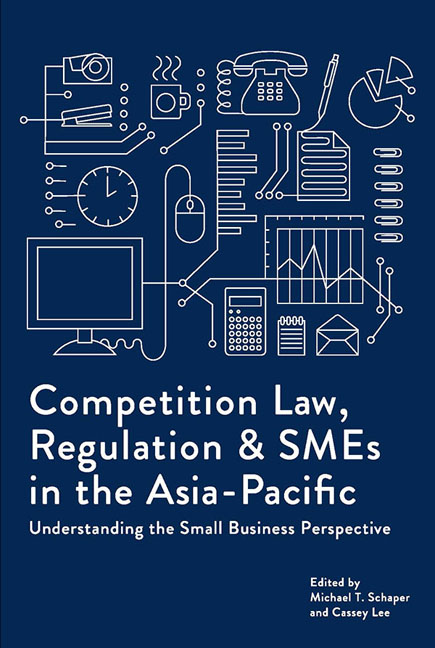 Competition Law, Regulation and SMEs in the Asia-Pacific
Competition Law, Regulation and SMEs in the Asia-Pacific Book contents
- Frontmatter
- Contents
- Foreword
- About the Contributors
- 1 Introduction: Making the Invisible SME More Visible in Competition Policy and Law
- Section 1 Theories And Basic Concepts
- 2 Smes, Competition Law, and Economic Growth
- 3 Competition Policy and Sme Policy: Strange Bedfellows?
- 4 The Competitive Experience of Uk Smes: Fair and Unfair
- 5 Competition Regulator Engagement with the Small Business Sector
- 6 Developing Online Competition Law Education Tools for Smes
- Section 2 Smes And Competition Law
- Section 3 Country Studies
- Index
2 - Smes, Competition Law, and Economic Growth
from Section 1 - Theories And Basic Concepts
Published online by Cambridge University Press: 05 August 2017
- Frontmatter
- Contents
- Foreword
- About the Contributors
- 1 Introduction: Making the Invisible SME More Visible in Competition Policy and Law
- Section 1 Theories And Basic Concepts
- 2 Smes, Competition Law, and Economic Growth
- 3 Competition Policy and Sme Policy: Strange Bedfellows?
- 4 The Competitive Experience of Uk Smes: Fair and Unfair
- 5 Competition Regulator Engagement with the Small Business Sector
- 6 Developing Online Competition Law Education Tools for Smes
- Section 2 Smes And Competition Law
- Section 3 Country Studies
- Index
Summary
SMEs (small and medium-sized enterprises) account for over 95 per cent of enterprises in APEC (Asia-Pacific Economic Cooperation) economies. There are differences in the concentration of SMEs between developed and developing economies. The role of SMEs in economic growth is best understood within a theoretical framework focusing on firm dynamics and firm size distribution. The entry and exit of small firms is a critical aspect of economic growth. There is some empirical evidence indicating that economic growth is associated with competition law. Micro-level evidence is likely to be needed to investigate how competition law affects SME's role in economic growth.
Introduction
The concept of “competition” has a near mythical status in economics. Economists have often used Adam Smith's “invisible hand” to illustrate the point that competition amongst buyers and sellers seeking to maximize their gains also benefits society. Less attention has been paid to Smith's cognizance that sellers can collude to the detriment of consumers. Likewise, Joseph Schumpeter has argued that the prospects of market power is also a key driver of innovation. Such contradictory perspectives on the role of competition have continued to perpetuate themselves in modern post-war theories of economic growth as well as the attendant empirical studies. Thus, the role of competition in economic growth is far from clear. To add to the predicament of policymakers and regulators seeking more direct answers, the nature and role of SMEs in economic growth is likely to be inconclusive and possibly even elusive as well.
Despite the existing knowledge gap, competition laws — legislation promoting market competition — have been implemented in many countries. To date, more than 130 jurisdictions around the world have implemented competition statutes in one form or another. It is thus useful to reassess what we know about SMEs, competition law, and how both are related to economic growth.
The purpose of this chapter is to provide a brief synthesis of what is known in the research literature, by examining the theoretical and empirical relationships between SMEs, competition law, and economic growth. The chapter will attempt to critically reflect on a few key questions. First, what is the nature and role of SMEs in the economy? Second, what role do SMEs play in economic growth? Finally, how does competition law affect this role?
To examine the above issues, this chapter begins with a discussion of the nature and role of SMEs in national economies.
- Type
- Chapter
- Information
- Competition Law, Regulation and SMEs in the Asia-PacificUnderstanding the Small Business Perspective, pp. 17 - 48Publisher: ISEAS–Yusof Ishak InstitutePrint publication year: 2016


